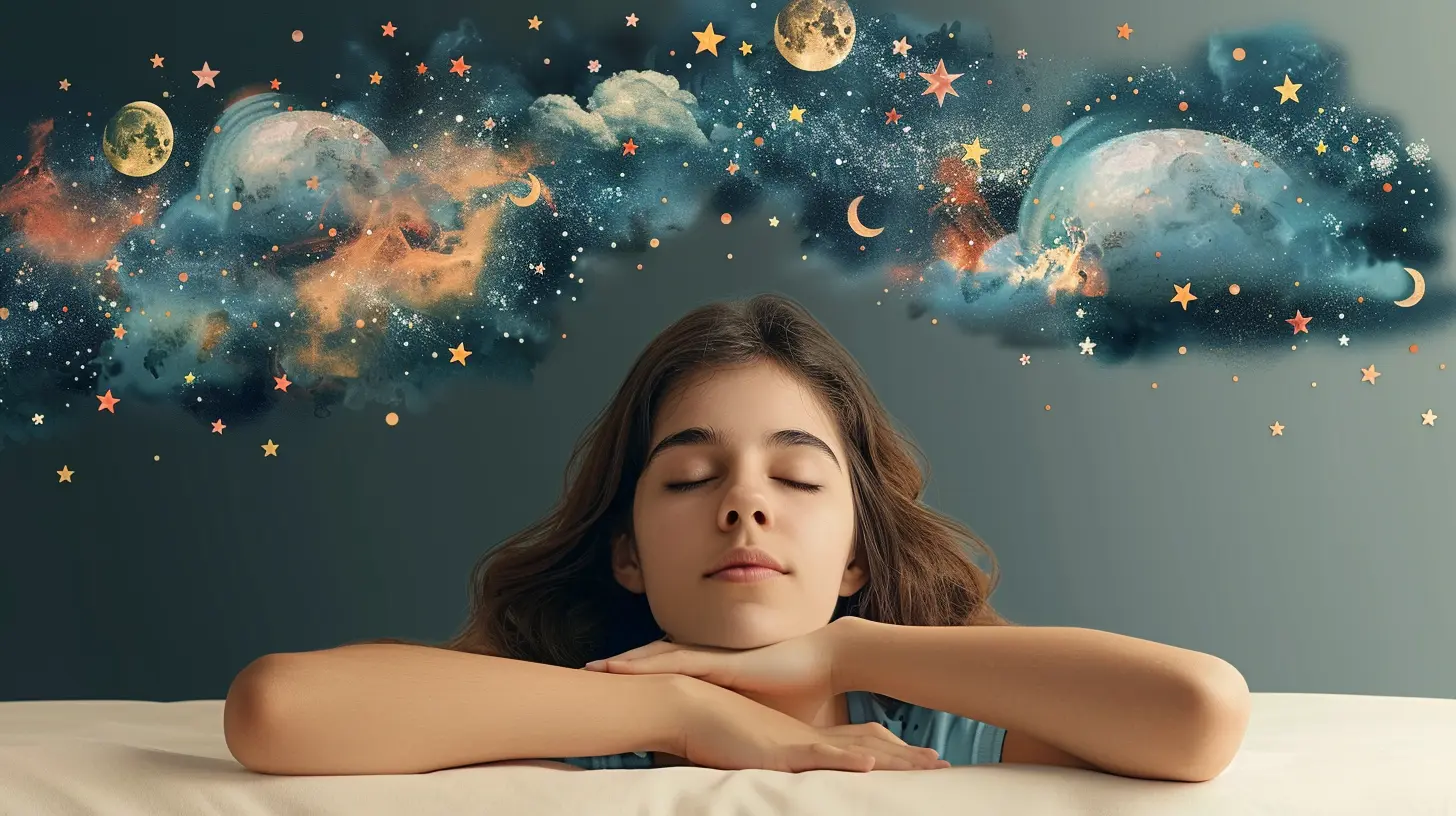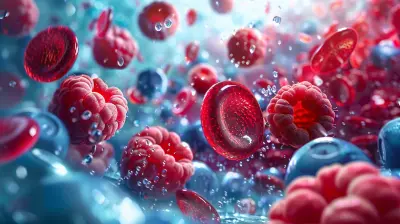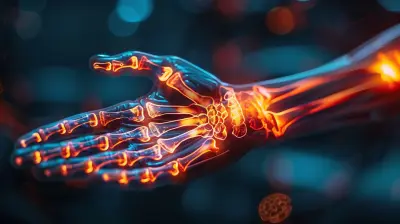Understanding the Link Between Hormones and Sleep Cycles
3 March 2025
Have you ever wondered why some nights you drift off to dreamland with the ease of a feather falling to the ground, while on others, you’re counting sheep until the crack of dawn? It turns out, hormones – those little chemical messengers zipping around your body – play a massive role in your ability to conk out and stay asleep. Let’s unravel the fascinating connection between hormones and sleep cycles in a way that’ll have you nodding along (and hopefully not off, just yet).

What Are Hormones, and Why Do They Matter?
First things first, let’s talk about what hormones are. Think of hormones as the postmen of your body. They carry important "letters" (aka signals) between your brain, glands, and organs, helping everything work in harmony. These chemical messengers regulate nearly every process in your body – from how hungry you feel to, yes, how well you sleep.When your hormones are out of whack, it’s like a mail strike in your body – the messages get delayed or lost, and you start to feel the effects. Your sleep, in particular, is highly sensitive to these hormonal fluctuations.
But which hormones are the real sleep MVPs? Let’s dive in. 
Meet the Hormones That Rule Your Sleep Cycles
1. Melatonin: The Sleep Superstar
You’ve probably heard of melatonin – it’s like the celebrity of sleep hormones. Produced by your pineal gland (a pea-shaped gland in the brain), melatonin is often called the “darkness hormone.” Why? Because it kicks into gear when the sun sets, letting your body know it’s time to wind down. Think of it as Mother Nature dimming the lights.When your melatonin levels rise, your body temperature drops, your breathing slows, and you start to feel sleepy. On the flip side, exposure to light – especially blue light from screens – halts melatonin production, keeping you wired.
Pro Tip: If you’re scrolling through your phone before bed, you’re pretty much waving goodbye to melatonin for the night.
2. Cortisol: The Alarm Clock Hormone
Cortisol often gets a bad rap because we associate it with stress, but it’s not all bad news. It actually has a critical role in your sleep-wake cycle. Cortisol levels naturally drop at night to help you sleep and then rise early in the morning to give you that “get-up-and-go” energy.However, if your stress levels are through the roof, your cortisol production can go haywire. High cortisol at bedtime is like having a car alarm blaring when you’re trying to relax – it's impossible to tune out.
3. Estrogen and Progesterone: The Sleep Regulators for Women
Ladies, this one’s for you. If you’ve ever noticed your sleep quality tanking before your period or during menopause, you can thank fluctuations in estrogen and progesterone.Estrogen helps keep your sleep steady by reducing hot flashes and stabilizing your mood, while progesterone has a calming, sedative-like effect. When hormone levels dip (like during PMS or menopause), sleep disturbances often follow. So, if you’re tossing and turning at certain times of the month, your hormones could be behind it.
4. Insulin: The Blood Sugar Balancer
Ever had a sugar crash that left you feeling drowsy? That’s insulin in action. This hormone regulates your blood sugar levels, and a steady blood sugar balance is crucial for quality sleep.If your insulin levels spike (say, after a late-night ice cream binge), your sleep could be disrupted. Plus, people with conditions like diabetes often experience sleep disturbances due to insulin imbalances. 
How Do Hormones and Sleep Cycles Work Together?
Now that we’ve met the key players, let’s break down how they all work together to regulate your sleep cycles.Sleep cycles are like a series of shows on your favorite streaming platform, with different stages – light sleep, deep sleep, and REM (rapid eye movement) sleep. Hormones dictate when you start a new “episode” of sleep and when it’s time to wake up.
For example:
- Melatonin ushers you into the early episodes of sleep, helping you enter light and deep sleep stages.
- Growth hormone (another key sleep hormone) springs to life during deep sleep, playing a starring role in repairing your body and tissues overnight.
- As morning approaches, cortisol starts warming up backstage so you can smoothly transition into wakefulness.
It’s all about timing. When one hormone is out of sync, it throws the entire “sleep schedule” into chaos. 
What Causes Hormonal Imbalances That Destroy Sleep?
Now, here’s the million-dollar question: What messes with this delicate dance of hormones?1. Stress Overload
Let’s be real – who hasn’t been stressed out? Chronic stress causes cortisol to go into overdrive, ruining your ability to fall and stay asleep. It’s like drinking five cups of coffee before bed.2. Poor Diet
What you eat has a direct impact on your hormones. Eating too much sugar or processed food can lead to insulin spikes, which may interfere with sleep. Lack of nutrients like magnesium, which helps produce melatonin, can also wreak havoc.3. Age and Life Stages
As you age, your body naturally produces less melatonin. Women going through menopause may also experience disrupted sleep due to shifts in estrogen and progesterone.4. Blue Light Exposure
If you’re glued to your phone or laptop late at night, the blue light can suppress melatonin production, making it harder to fall asleep.5. Underlying Health Conditions
Conditions like hypothyroidism and PCOS (polycystic ovarian syndrome) are often linked to hormone imbalances that can mess with your sleep.Tips to Support Healthy Hormones and Better Sleep
Alright, now that we’ve diagnosed the problem, let’s talk solutions. The good news is you don’t need a Ph.D. in endocrinology to get your hormones in check. A few simple lifestyle tweaks can go a long way.1. Stick to a Sleep Schedule
Your body LOVES routine. Going to bed and waking up at the same time every day helps regulate melatonin levels.2. Limit Blue Light Before Bed
Invest in blue light-blocking glasses or put your devices on night mode. Better yet, switch to a good book or meditation app an hour before bed.3. Manage Stress
Try stress-busting activities like yoga, deep breathing, or mindfulness. Remember, less stress means less cortisol, which equals better sleep.4. Eat Hormone-Friendly Foods
Incorporate foods rich in magnesium (like spinach, almonds, and dark chocolate) and omega-3s (found in fish and walnuts) into your diet. These nutrients support sleep hormones like melatonin.5. Exercise, But Not Too Late
Regular movement is great for balancing hormones and promoting sleep. Just avoid working out too close to bedtime, as it can spike cortisol.6. Consider Natural Supplements
If you’re struggling, natural remedies like melatonin supplements or adaptogenic herbs like ashwagandha can help regulate your sleep hormones. Always consult with your doctor first, though.Conclusion
At the end of the day (literally), your sleep is a symphony conducted by a delicate balance of hormones. From melatonin and cortisol to estrogen and insulin, these chemical messengers ensure you get the rest you need to thrive. While hormonal imbalances can disrupt this harmony, small lifestyle changes can make a world of difference.So, the next time you find yourself lying awake staring at the ceiling, you might want to think less about the sheep and more about your hormones. Sleep tight!
all images in this post were generated using AI tools
Category:
Sleep HealthAuthor:

Laura Hudson
Discussion
rate this article
8 comments
Sadie McGeehan
Hormones significantly influence sleep quality and patterns.
April 3, 2025 at 3:10 AM

Laura Hudson
Absolutely! Hormones play a crucial role in regulating sleep by influencing patterns and quality, highlighting the importance of understanding their impact on our sleep cycles.
Willow Patterson
Great article! Understanding the connection between hormones and sleep is crucial for our overall well-being. Awareness is the first step towards improving our sleep quality. Let's prioritize our health by listening to our bodies and making informed choices. Sweet dreams ahead!
March 19, 2025 at 3:40 AM

Laura Hudson
Thank you! I'm glad you found the article insightful. Prioritizing our health and understanding our bodies is indeed key to better sleep! Sweet dreams!
Victoria McGinn
Essential insights on hormones affecting sleep quality.
March 15, 2025 at 5:49 PM

Laura Hudson
Thank you! I'm glad you found the insights helpful. Hormones play a crucial role in regulating our sleep cycles, and understanding this link can improve sleep quality.
Theodore McKinnon
This article succinctly highlights the intricate relationship between hormones and sleep cycles, emphasizing how hormonal fluctuations can significantly impact sleep quality. Understanding this connection is crucial for improving overall health and wellness.
March 15, 2025 at 3:47 AM

Laura Hudson
Thank you for your insightful comment! I'm glad you found the article informative and appreciate the importance of this connection for health and wellness.
Tobias McClendon
Great insights on hormones' impact on sleep!
March 14, 2025 at 5:50 AM

Laura Hudson
Thank you! I'm glad you found the insights helpful. Hormones play a crucial role in our sleep patterns!
John Young
This article offers fascinating insights into how our hormones influence sleep patterns! I’m curious about which specific hormones play the biggest roles and how lifestyle choices might impact these connections. Excited to learn more about improving sleep through hormonal balance!
March 12, 2025 at 5:30 AM

Laura Hudson
Thank you for your enthusiasm! Key hormones like melatonin, cortisol, and progesterone significantly influence sleep patterns. Lifestyle choices such as diet, exercise, and stress management can greatly impact hormonal balance and, in turn, improve sleep quality. Stay tuned for more details!
Margaret McMillen
Who knew my hormones had a secret nightlife?! While I’m trying to catch Z's, they’re throwing a party. Maybe I should start a sleep schedule for them—'No hormones allowed after 10 PM!'”
March 11, 2025 at 4:47 AM

Laura Hudson
Hormones do have a way of disrupting our sleep! Establishing a consistent sleep schedule can indeed help regulate their "nightlife" and promote better rest.
Zaren McCarron
Balancing hormones is crucial for restorative sleep. Recognizing their impact on our sleep cycles empowers us to make informed lifestyle choices, ultimately fostering better health and well-being. Sleep is vital; nurture it wisely.
March 6, 2025 at 4:30 AM

Laura Hudson
Thank you for your insightful comment! You're absolutely right—balancing hormones is key to achieving restorative sleep and overall well-being.
MORE POSTS

Supercharge Your Day with These Nutrient-Packed Smoothies

The Hidden Role of Inflammation in Blood Sugar Imbalance

How Drinking Water Helps Prevent Kidney Stones

Mastering Plant-Based Protein: A Guide for Vegan Athletes

How to Strengthen Your Bones Without Stressing Your Joints

Why Mobility is Crucial in a Strength Training Program